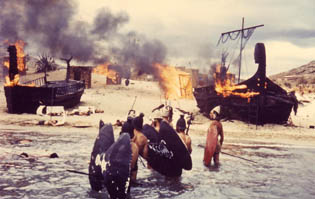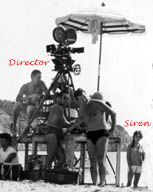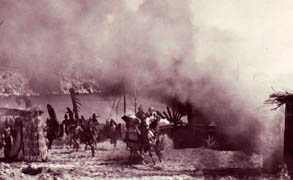| 
Today is already brighter.
The six ships on the beach, doused in Napalm, are finally
on fire. Since their hulls are water-logged from
the many years they spent under the Aegean, all that
burns from them are the local telephone poles that serve
as masts, and the plywood prow heads.
When I had arrived here late last night, all that was
ablaze on the beach was a campfire surrounded by a party
of the Iliad production crew. Joe Powell, the
stuntman, was serenading Susan with a guitar.
The Cinematographer, Werner Kurz, a viewfinder in one
hand and a bottle of Retzina wine in the other, was
observing a Salome-like dance that was being performed
by Alecki, a shapely art student interning as a Wardrobe
mistress. Further from the campfire, under
the totemic prow of a beached ship, was my out-of-control
director, Desmond O’Donovan. He seemed totally
entranced by Anna, the teen-age daughter of the set
carpenter (though he spoke no Greek, and she spoke no
English).
I discreetly extricated O'Donovan
from the charms of this young siren to give him new
marching orders. Tomorrow, without any further
delays, he was to shoot the establishing shot for the
battle of the ships. Puzo's script called for
the camera to be mounted on a platform in the water
so that the picture framed a gauntlet of two burning
ships filled by battling Greek and Trojan soldiers.
"I wish that it was possible
but you can see it's going to be overcast tomorrow,"
he said, pointing to the night's sky. "But
don't worry. I have written a great contingency scene.
It has a magnificent-looking old man-- he must be 90--
tussling with the dog for his bone. It represents.."
"No old man, no dog, no more
metaphors " I angrily interrupted. Since Rudy
Mate had told me his best shots in The Passion of
Joan of Arc were in cloudy weather, I had been
seething over O'Donovan's delays.. "Clouds or no
clouds, rain or shine, shoot the battle scene."
O'Donovan called Kurz over,
who raised the issue of his reputation as a cinematographer
(even though previously he had only been a camera operator).
"I will shoot in bad weather if you insist,
but I will not put my name on the clapboard."
"Neither will I," Donovan
said, his gaze still fixed on his Siren.
" Put my name on the clapboard
as both cinematographer and director," I volunteered,
expanding my portfolio of credits and ending the issue.

Not having been on a movie
set before, I had no idea how long it would take to
prepare 1,200 extras for a single shot. At 7 a.m.
the student interns from Athens began the somewhat precarious
job of fitting the Greek Soldiers into loin cloths.
What made the task dicey was that Susan had meticulously
copied the Trojan loincloth from a highly-stylized vase
in the Knossos museum that depicted a row of wasp-waisted
Minoan warriors. Unfortunately, modern Greek soldiers
did not have the same hour glass figures. Given
the embarrassing mismatch, most of the extras insisted
on wearing their polka-dotted boxer shorts under the
loincloths. So the student dressers had to make
the necessary alterations on hundreds of the plumper
(or less exhibitionist) soldiers.
Building the camera platform on pylons during
low tide was also time consuming. The carpenters
(including the Siren's irate father) waded out to the
half-sunk LST landing ship, and using it as a seaward
base, began building it, testing it by jumping on it,
then, when it collapsed, rebuilding it.
On shore, meanwhile, my German pyrotechnician,
Herr Baumgarten, used a squad of prison volunteers to
load each of the 6 ships with a ton of kerosene-soaked
tires from a nearby waste dump. He then taught
them how to smear incendiary napalm on the ship's masts
and railings. Meanwhile, the stuntmen supervised
the erection of the stacks of cardboard boxes that would
break their fall when they leapt from the fiery decks.
By noon, the wranglers were still struggling to attach
two large (and rearing) white horses, supplied by the
King's Guards, to a flimsy chariot built by the local
blacksmith. The problem again proceeded from Susan's
brilliant effort to get life to imitate art. As with
the loincloths, Susan had taken the design from a beautiful
Mycenean vase. Our imitation overlooked the fact
that horses had changed in 3,000 years.
Finally, at 3 pm, after the crew
had had their lunch, the crew wades out to the platform
in a rising tide. Kurz tests the camera and signals
it works. O'Donovan signals the assistant director,
Eric Andreo. Baumgarten sets the ships afire.
The extras, all in position, raise their shields. The
camera is rolling. The clapboard--with my name on it--claps
"Take 1." Eric shouts over and over
again "Mache" [War], but the soldiers do not
move. It is a mutiny. They claim the sand is too hot
for their bare feet. "Cut," O'Donovan
shouts.
While the dressers scrounge up sandals
and rags for the soldiers to wear, Baumgarten's
crews put out the fires, which is not difficult since
the telephone polls and prow heads have burnt to a crisp
by now. The prisoners then replace them by sending
out a foraging party to gather other telephone poles
from the road to Athens (and adding to the area's communications
failures).
Meanwhile, the tide rises nearly
to the level of the camera platform. It is now
5 p.m. The army is again placed in position but
this time, at my suggestion, the untested charioteer
(driven by Joe Powell) is just behind the extras.
The fires are relit, the camera
rolls, the clapboard claps "Take 2", the wranglers
release the chariot from the guide ropes, the horses
rear, hoofs flashing. Eric Andreo again shouts "Mache,"
and the soldiers charge forward in to the gauntlet of
burning ships pursued by the chariot. The expressions
of fear on their face are not entirely pretense: they
now know, like everyone else on the set, that the chariot
has no brakes and is completely out of control.

"Cut. Great, Print it, "
O'Donovan yells, along with his one Greek word "Efcharisto
(Thank you)". The water now partly submerges
the camera platform.
|

